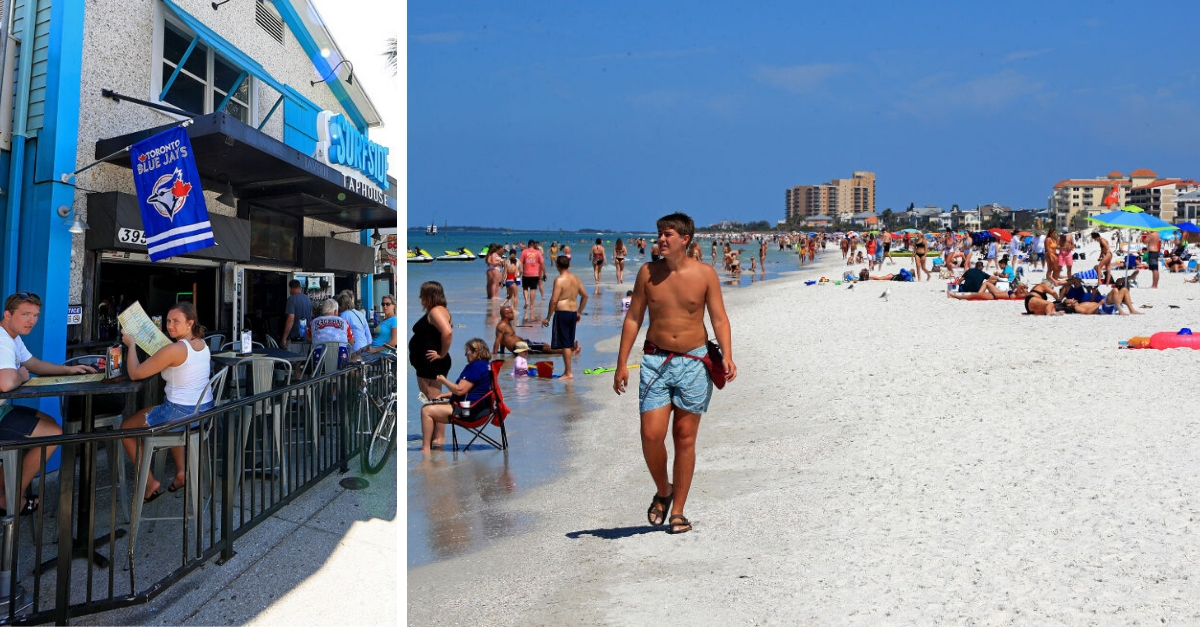
Florida beaches are known to be one of the most popular spots in the country for spring breakers. Amid warnings about social distancing as the coronavirus continues to rapidly spread, many thought those beaches would be desolate. Sadly, the opposite has been true.
Interviews with spring breakers on Florida beaches show they have little to no concern about the coronavirus. Many of these young adults believe that because they aren't part of the most vulnerable communities, their lives shouldn't be disrupted. Several noted it was unfair that they'd miss out on long-awaited spring break plans because of something out of their control. Others said that if they did contract COVID-19, it would be no worse than a bad cold or the flu.
Footage of interviews expressing these attitudes quickly amassed over 23 million views. The flippant attitude outraged many and called attention to what an issue the beaches had become for public health. It also led to much-needed closures that are a bummer to spring breakers but a relief to everyone else.
Spring break in Florida is big business. It's also big fun for the young adults who flock to the Florida beaches each year. Things are different this year, however, and visitors who have been trying to ignore that fact could potentially be putting themselves in danger.
A video shared by CBS News alarmed many who are socially distancing as concerns about the coronavirus grow throughout the country. It seems that after Governor Ron DeSantis issued a state order on Tuesday mandating all bars and nightclubs to close for 30 days to stop the spread of the virus, spring breakers flocked to the beach. They aren't concerned about getting ill.
"If I get corona, I get corona. At the end of the day, I’m not gonna let it stop me from partying," Brady Sluder told reporters.
"We’ve been waiting for Miami spring break for a while, about two months we’ve had this trip planned. We're just out here having a good time. Whatever happens, happens."
More than 23 million people watched the video, in awe of how "selfish" and "entitled" the young adults sounded. Concern has continued to spread, calling for the beaches to be shut down as well.
"It’s really messing up with my spring break," another spring breaker told Reuters. "What is there to do here other than go to the bars or the beach? And they’re closing all of it. I think they’re blowing it way out of proportion. It's doing way too much."
Some of the spring breakers even thought their decisions to be woke. "This virus ain’t that serious," one noted. "There’s more serious things out there like hunger and poverty and we need to address that."
Thursday, Florida officials started taking action. Miami-Dade County Mayor Carlos Giménez announced that all parks and beaches in the county would be closed as of 9 a.m. He also announced the closure of nonessential retail and commercial businesses, such as casinos, nail salons, malls, and spas.
Miami-Dade County isn't alone. Okaloosa County, Walton County, Lee County, Sarasota County, and Manatee County will also close their beaches. Joining them are the cities of Tampa and Naples. Clearwater Beach will close on Monday for two weeks.
Governor DeSantis has not taken action to close beaches on a state level. Many are concerned this will just cause more people to meet on the beaches that do remain open. Despite this, he's happy with local closures, which he thinks will make a big difference.
"The message I think for spring breakers is that the party’s over in Florida, you’re not going to be able to congregate on any beach in the state," he said.
"Many of the hot spots that people like to go to, whether it’s Miami Beach, Fort Lauderdale, Clearwater Beach, are closed entirely for the time being." He thinks this will be enough of a deterrent.
"The bars are closed so you’re not going to have a place to congregate there, so we would just tell those folks maybe come back next year when things are better, but that is not what we’re looking for here in the state of Florida," he continued.
"Every single beach will have to abide by the CDC guidelines, no more than 10 people, you have to be socially distant, not every beach is going to remain open, but some will." Of course, those guidelines have been in place for some time and are not being enforced by local officials, judging by the crowding that has already occurred.
As of 11 a.m. Thursday, there were a reported 390 cases of COVID-19 in Florida, according to the state's Department of Health. Eight people have already died from the illness in the state. Access to testing is still a struggle in many states. Subsequently, an additional 970 people are being monitored.
Of the cases in Florida, 86 are in Miami-Dade county. There are 96 cases in Broward County. An additional 29 cases have been reported in Palm Beach County. All are popular spring break destinations, which leads many to believe these numbers will spike in the coming days.




